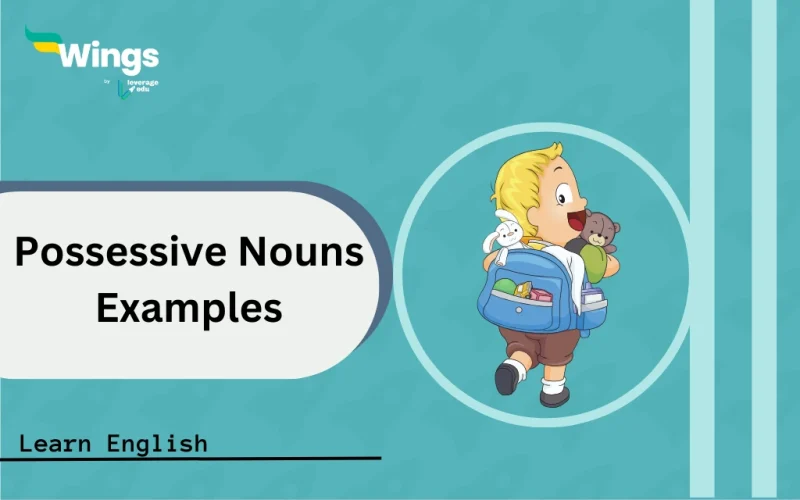Possessive Nouns examples: Possessive nouns, as the name suggests, a names given to the type of nouns that talk about ownership. They become plural nouns by adding an apostrophe at the end of the noun and not an ‘s’. However, they do not indicate literal ownership. Some common examples of possessive nouns include employees’, student’s, team’s, love’s, Canada’s etc. In this blog, you will find several examples of possessive nouns that will give you a better understanding.
This Blog Includes:
Must Read: Here’s all you need to know about Nouns
What are Possessive Nouns?
A possessive noun is considered to be a special form of a noun which is used to indicate ownership. In a sentence, a possessive noun is indicated wherein the owner (possessor) or something usually comes right before another noun representing what they own. Possessive nouns are indicated with an apostrophe (‘) and an ‘s’ at the end of the singular noun.
Example:
- Peter’s toy car.
- Employees’ uniforms
Must Read: What are Possessive Nouns? Meaning, Usage & Examples
99+ Examples of Possessive Nouns
As discussed above, possessive nouns when included in sentences talk about ownership. However, they are more than that. Here are 99+ examples of all the possessive nouns which will help you gain an understanding.
Singular Possessive Noun
| Dog’s | Cat’s |
| Doctor’s | Sister’s |
| Teacher’s | Student’s |
| Car’s | Book’s |
| Child’s | Friend’s |
| Country’s | Parent’s |
| Elephant’s | President’s |
| Brother’s | House’s |
| City’s | Farmer’s |
| Writer’s | Lawyer’s |
| Bird’s | Mountain’s |
| Ocean’s | Sun’s |
| Moon’s | Business’s |
Plural Possessive Noun
| Dog’s collars | Cat’s toys |
| Student’s books | Teacher’s desks |
| Birds’ nest | House’s roofs |
| Cars’ tires | Children’s toys |
| Horses’ stable | Parents’ advice |
| Countries’ borders | Employees’ benefits |
| Friends’ opinions | Siblings’ room |
| Trees’ branches | Gardens’ flowers |
| Workers’ uniforms | Teams’ strategies |
| Players’ skills | Lawyers’ cases |
| Restaurants’s menus | Artists’ paintings |
| Athletes’ achievements | Nurses’ duties |
| Employees’ duties | Coaches’ decisions |
Possessive for Multiple Nouns
| The students’ books | The cats’ toys |
| The teachers’ lounge | The dogs’ leashes |
| The parents’ meeting | The cars’ engines |
| The employees’ uniforms | The houses’ roofs |
| The friends’ plans | The countries’ borders |
| The siblings’ bedrooms | The artists’ paintings |
| The computers’ screens | The athletes’ achievements |
| The companies’ profits | The musicians’ instruments |
| The birds’ nests | The workers’ tools |
| The neighbors’ gardens | The actors’ performances |
| The chefs’ recipes | The students’ backpacks |
| The writers’ ideas | The teams’ strategies |
| The children’s toys | The employees’ benefits |
Hyphenated and Compound Possessive Nouns
| Mother-in-law’s car | Editor-in-chief’s decision |
| Attorney-at-law’s office | Maid-of-honor’s dress |
| Secretory-of-state’s announcement | Son-in-law’s job |
| Commander-in-chief’s strategy | President-elect’s speech |
| Mother-of-pearl’s shine | Sister-in-law’s advice |
| Daughter-in-law’s responsibility | Attorney general’s opinion |
| Brother-in-law’s birthday | Commander-in-chief’s authority |
| Editor-in-chief’s role | Father-in-law’s garden |
| Man-of-war’s capabilities | Son-in-law’s dedication |
| Attorney-at-law’s expertise | Surgeon-general’s report |
| Secretory-of-state’s visit | Daughter-in-law’s kindness |
| Commander-in-chief’s address | Mother-of-pearl’s lustre |
| Attorney-general’s decision | Sister-in-law’s support |
Also Read: Possessive Adjective
Check Related Blogs!
| Types of Nouns | Noun, Verb, Adjective, & Adverb |
| Compound Nouns | How to Use Nouns and Prepositions |
| Collective Nouns: | Plural Nouns |
| Countable and Uncountable Nouns | Abstract Noun |
FAQs
A possessive noun is a noun that indicates ownership of something. They are commonly created by adding an apostrophe or an ‘s’ at the end of the singular noun.
Yes, names can become possessive nouns. To do so, simply add an apostrophe (‘) and an ‘s’ at the end. Example: Charle’s car.
Nouns which have everyday things which could include non-specific people, places, things, or ideas are known as common knowns.
We hope this blog on ‘examples of possessive nouns’ provided you with the required knowledge. To advance your grammar knowledge and read more informative blogs, check out our Learn English page and don’t forget to follow Leverage Edu.


 One app for all your study abroad needs
One app for all your study abroad needs












 60,000+ students trusted us with their dreams. Take the first step today!
60,000+ students trusted us with their dreams. Take the first step today!